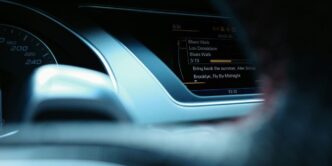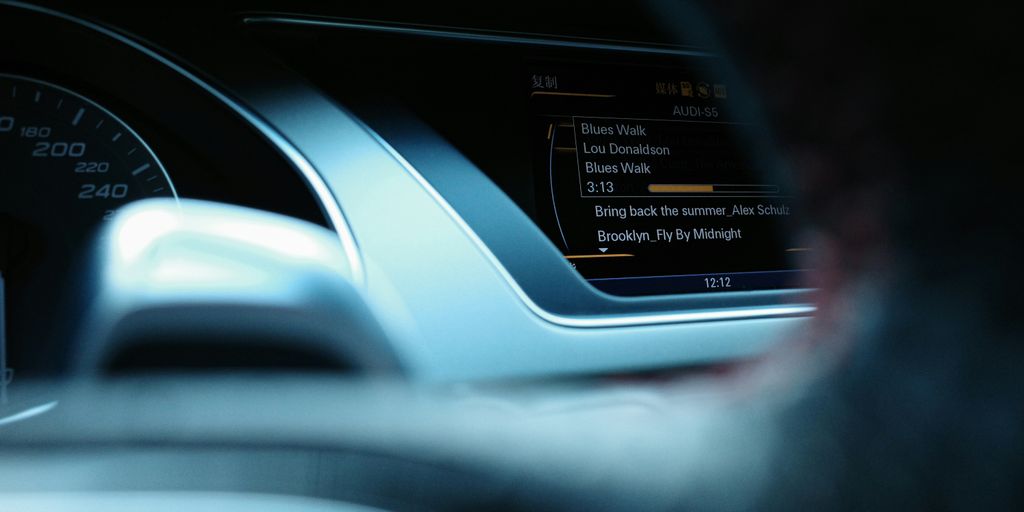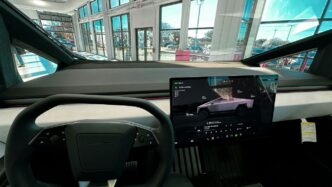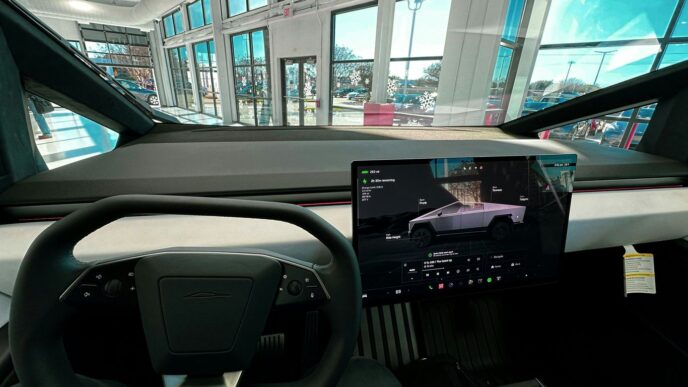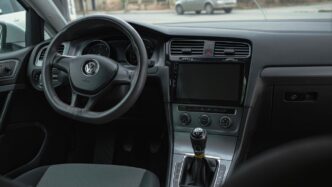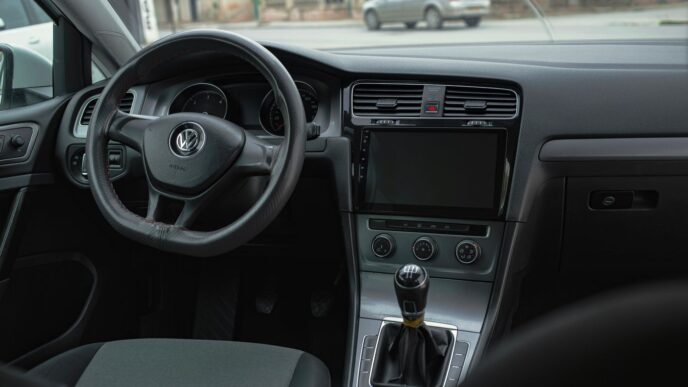If you own a Hyundai electric vehicle, you might have heard about an issue with the ICCU. It sounds technical, but it’s pretty important for your car. Basically, a problem with this unit can stop your car’s small battery from charging, and in some cases, that could mean your car just stops running. Hyundai has put out a recall for this, so if you have one of the affected models, it’s good to know what’s going on and what you need to do.
Key Takeaways
- Hyundai has recalled about 145,000 electric Ioniq and Genesis vehicles because of a potential problem with the Integrated Charging Control Unit (ICCU).
- This ICCU issue can stop the car’s 12-volt battery from charging, which might cause the vehicle to lose power while driving.
- The recall includes certain 2022-2024 Ioniq 5, 2023-2025 Ioniq 6, and 2023-2025 Genesis models. Kia vehicles with the same part are also affected.
- Hyundai will notify owners and plans to offer free checks, ICCU replacements, or software updates to fix the problem.
- This recall follows earlier actions for similar issues, highlighting ongoing efforts by Hyundai to address vehicle component reliability.
Understanding the ICCU Issue in Your Hyundai

So, what exactly is this ICCU thing that’s causing a stir among Hyundai owners? It stands for Integrated Charging Control Unit, and it’s a pretty important piece of equipment in your electric Hyundai. Think of it as the brain that manages how your car’s high-voltage battery talks to the smaller, 12-volt battery that powers all your car’s accessories – like the lights, radio, and power windows. It also plays a role in charging that 12-volt battery. When the ICCU has a problem, it can stop the 12-volt battery from getting charged.
What is the Integrated Charging Control Unit?
Basically, the ICCU is a converter. It takes power from the big battery pack and converts it into the lower voltage needed to keep the 12-volt battery topped up. This 12-volt battery is still super important, even in an EV, because it runs all the regular car systems. Without a properly charged 12-volt battery, things start to go wrong. It’s also involved in features like bidirectional charging, which lets your car power external devices or even your home.
How the ICCU Affects Your Electric Vehicle
If the ICCU isn’t doing its job, the 12-volt battery won’t charge. At first, you might not notice anything. The car will run fine on the power it has. But as the 12-volt battery drains, you’ll start seeing warning lights pop up on your dashboard. Eventually, critical systems could shut down. This could mean your car won’t start, or worse, it could lose power while you’re driving. It’s a bit like your phone’s battery dying – everything just stops working. Some owners have reported issues even after a software update, suggesting the problem might be more than just a glitch [4789].
Potential Consequences of ICCU Failure
The most immediate consequence is the loss of the 12-volt battery’s charge. This can lead to a cascade of problems. You might experience:
- Warning lights: Various system warnings will likely appear on your instrument cluster.
- Inability to start: The car may refuse to start or turn off unexpectedly.
- Loss of power: In severe cases, the vehicle could lose motive power while in motion, which is obviously a safety concern.
- Malfunctioning accessories: Features like infotainment, climate control, and power windows might stop working correctly.
It’s a situation that definitely needs attention from Hyundai to get sorted out.
Hyundai’s Response to ICCU Concerns
So, what’s Hyundai actually doing about this whole ICCU situation? It’s a pretty big deal, affecting a lot of their electric cars, including the Ioniq and Genesis lines.
Details of the Recent Recall
Hyundai Motor America put out a recall notice covering about 145,000 electric vehicles. This is because the Integrated Charging Control Unit, or ICCU, might not be working right. If it fails, your car’s 12-volt battery might not get charged, and that could mean losing power while you’re driving. The models involved are the 2022-2024 Ioniq 5, the 2023-2025 Ioniq 6, and several Genesis models from 2023 to 2025. They’re supposed to start telling owners about this by January 17th.
Hyundai’s Proposed Solutions
Hyundai’s plan is to fix these cars for free. They’re going to check the ICCU, and if it’s bad, they’ll replace it. They’re also pushing out a software update. This update is designed to stop overcurrent problems by managing voltage spikes when the battery charges and by adjusting how the cooling fan and water pump work. It’s basically a way to prevent the ICCU from getting damaged in the first place. They’re also looking into ways to improve the technology going forward, aiming for better safety and reliability.
Previous Actions and Ongoing Investigations
This isn’t the first time Hyundai has had to deal with ICCU problems. They had a recall back in March 2024 for almost 99,000 vehicles. Even after that software fix, more cars started having issues between June and November. This led Hyundai to dig deeper, investigating the problem from January to September 2023. They even showed the National Highway Traffic Safety Administration (NHTSA) how the defect happens, which shows they’re taking it seriously and need to do more than just a simple software patch. It’s a bit concerning that these issues keep popping up, especially when you consider how much people rely on their cars every day. It makes you wonder about the overall quality control, especially with new tech like electric vehicles. For example, some owners have reported issues with their cars shortly after getting them serviced, which really shakes your confidence. It’s a tough situation when you’re trying to trust a brand that’s also winning awards for other things, like being the Best SUV Brand of 2025. It’s a mixed message, for sure. You can find more information about vehicle recalls and safety updates on the NHTSA website.
Identifying Affected Hyundai Models
So, which Hyundai vehicles are actually part of this ICCU recall? It’s not just one or two models; Hyundai has identified a significant number of their electric and hybrid vehicles that could be affected. The recall primarily targets certain Ioniq and Genesis models. This is a pretty big deal, considering how popular these vehicles are.
Which Ioniq and Genesis Models Are Included
Hyundai has been pretty specific about the model years involved. For the Ioniq lineup, the recall covers:
- 2022-2024 Ioniq 5: This popular electric crossover is a key part of the recall.
- 2023-2025 Ioniq 6: The sleek electric sedan also falls under this umbrella.
On the Genesis side, the luxury brand’s electric offerings are also included:
- Various 2023-2025 Genesis Models: While not all Genesis models are specified, the recall clearly indicates that certain electric Genesis vehicles from these years are affected. It’s best to check your specific VIN if you own a Genesis EV.
Understanding the Scope of the Recall
We’re talking about a substantial number of vehicles here, around 145,000 electrified Hyundai and Genesis models in the US alone. The issue stems from a potential defect in the Integrated Charging Control Unit (ICCU). This component is vital for charging the 12-volt battery, which in turn powers many of your car’s accessories and systems. If it fails, the 12-volt battery might not charge, potentially leading to a loss of drive power. Reports on social media suggest potential ICCU failures in 2025 Ioniq 5 models, with some instances also noted in earlier year models. The exact prevalence of these failures is still being determined. It’s a serious concern that could leave you stranded.
Impact on Other Kia Models
It’s not just Hyundai owners who need to be aware. Because Hyundai and Kia share a lot of the same underlying technology and components, this ICCU issue also affects a number of Kia vehicles. Specifically, around 63,000 Kia models, including the EV6, are part of a related recall. This means the total number of vehicles impacted across both brands is over 208,000. So, if you have a Kia EV6, it’s worth checking if your vehicle is included in their recall as well.
Navigating the ICCU Recall Process

So, you’ve heard about the ICCU recall and are probably wondering what to do next. It’s not the most fun news, but Hyundai is trying to get this sorted out.
What Owners Need to Do
First off, don’t panic. Hyundai is sending out official notifications to owners, so keep an eye on your mail. If you’re worried or haven’t heard anything by mid-January, it’s a good idea to contact your local Hyundai dealer directly. They can check if your specific vehicle is part of the recall and what the next steps are. It’s important to get this checked out to avoid any potential issues with your car’s charging system.
Ensuring Your Vehicle Receives the Update
When you take your car in, the dealership will perform an inspection. Depending on what they find, they might update the software, replace the ICCU itself, or both. The goal is to fix the underlying problem that could stop your 12-volt battery from charging. You can ask the dealer about the specific work being done. Some owners have reported that the update process is pretty quick, sometimes taking less than 30 minutes. You can also use apps like PlugShare to find charging stations if you need to plan your trips around service appointments.
What to Expect During Service
Plan for your car to be at the dealership for a bit. While some fixes are fast, others might take longer depending on parts availability and the dealership’s schedule. It’s always a good idea to call ahead and book an appointment. They might offer a loaner vehicle or shuttle service, so ask about those options when you schedule your visit. Hyundai is working to address this across a large number of vehicles, so patience is key. You can also check the NHTSA website for the latest recall information.
Broader Implications for Hyundai Owners
So, this ICCU recall, while specific to certain electric models, really makes you think about the bigger picture with Hyundai, doesn’t it? It’s not just about this one part failing; it’s about what it might signal about the company’s overall approach to quality. We’ve seen other issues pop up over the years, like those engine problems that affected a ton of their gasoline cars. It’s like, you buy a car, you expect it to just work, right? But then you hear stories about engines blowing up way too early, even with regular oil changes. It makes you wonder if they’re cutting corners somewhere.
Concerns About Quality Control
It’s tough when you hear about these widespread issues. You see Hyundai getting awards for best SUV brand, which is great, but then you also read about owners having major problems. It feels like a mixed message. Some people have Hyundais that run forever, racking up hundreds of thousands of miles without a hitch, which is awesome. But then you have others whose cars have serious issues way before they should. This inconsistency is what really gets people talking. It’s not just about one bad batch of parts; it suggests that maybe the factory processes themselves aren’t always as solid as they should be. Think about it: if machining debris can get into engine blocks during assembly, that’s a pretty big oversight. It makes you question how thoroughly everything is checked before a car leaves the factory. It’s a gamble you shouldn’t have to take when buying a new vehicle.
The Role of Software Updates
Now, about those software updates. They’re supposed to fix things, right? And sometimes they do. But it’s also a bit concerning that so many problems seem to be tied to software. It makes you wonder if the hardware is even designed properly in the first place, or if they’re just trying to patch up underlying issues with code. We’ve seen reports of dashboard icons flickering, and sometimes that’s just a software glitch. But what if it’s a symptom of something more? It’s hard to say without being an engineer, but it does make you think about how much we rely on software these days, and how vulnerable that makes our cars. It’s a whole new layer of complexity to worry about. You can find more information about how vehicle data might be shared with insurance companies, which is another interesting angle to consider dashboard icon flickering.
Hyundai’s Commitment to Reliability
Hyundai says they’re committed to making things better, and that’s good to hear. They’re talking about improving technologies and being more open with customers. That’s definitely a step in the right direction. After all, cars are a huge investment for most people. You want to feel confident that the car you bought is going to be reliable for years to come. When recalls happen, especially for critical components like the ICCU, it shakes that confidence. It’s not just about getting the car fixed; it’s about trusting the brand. Hopefully, these actions show that Hyundai is serious about building a reputation for dependability, not just for stylish designs and good warranties. We’ll have to wait and see if these efforts translate into fewer problems down the road for everyone.
Wrapping Up: What’s Next for Hyundai Owners?
So, we’ve looked at the ICCU issue affecting a bunch of Hyundai and Genesis electric models. It’s a bit of a headache, for sure, potentially leaving drivers without a charged 12-volt battery and, in the worst case, losing power. Hyundai is recalling these vehicles to fix it, offering inspections and repairs. It’s good they’re addressing it, especially since this isn’t the first time they’ve had to recall vehicles for similar problems. For owners, the main thing is to stay informed and get your car checked out. Hopefully, these fixes will sort things out for good and keep you rolling safely.
Frequently Asked Questions
What exactly is the ICCU in my Hyundai electric car?
The ICCU, or Integrated Charging Control Unit, is a key part in your Hyundai electric car. It’s like the car’s brain for charging the small 12-volt battery that powers things like your lights and radio. It also helps with special charging features. When it has a problem, it can stop the 12-volt battery from getting charged.
Why is Hyundai recalling some of its electric cars?
Hyundai has sent out a recall for certain Ioniq and Genesis electric models. This is because the ICCU might not work right. If this happens, the smaller 12-volt battery won’t charge, and this could cause the car to lose power while you’re driving, which is dangerous.
Which Hyundai and Kia models are affected by this recall?
Hyundai is recalling about 145,000 Ioniq and Genesis electric vehicles. This includes models like the 2022-2024 Ioniq 5, the 2023-2025 Ioniq 6, and some Genesis models from 2023-2025. They are also recalling about 63,000 Kia electric cars that use the same part.
What should I do if my Hyundai is part of this recall?
Hyundai will notify owners, likely by mid-January. If you have an affected vehicle, you should contact your Hyundai dealer. They will check your car and fix the ICCU issue for free. This might involve a software update or replacing the ICCU unit itself.
Has Hyundai had ICCU problems before?
This isn’t the first time Hyundai has had issues with the ICCU. They had a similar recall in March 2024. Even after fixing some cars, new problems popped up, leading to this bigger recall. They’ve been investigating the problem to find the best solution.
Does this recall affect Kia cars too?
Yes, this ICCU problem also affects Kia electric cars, like the EV6, because they share the same part with some Hyundai models. This means over 208,000 electric vehicles in total are included in these recalls.

